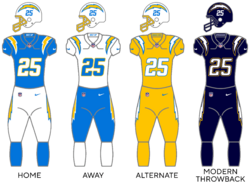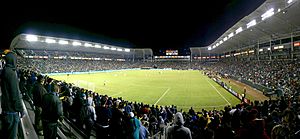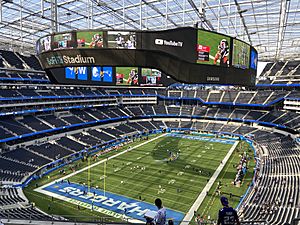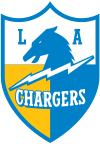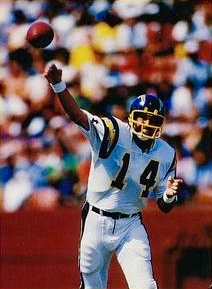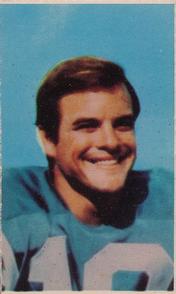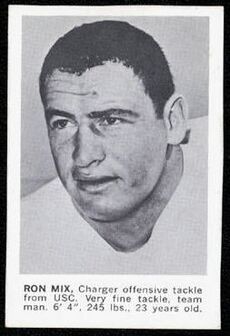Los Angeles Chargers facts for kids
Quick facts for kids Los Angeles Chargers |
|||||||||||||
|---|---|---|---|---|---|---|---|---|---|---|---|---|---|
|
|||||||||||||
| Basic info | |||||||||||||
| Established | August 14, 1959 | ||||||||||||
| Stadium | SoFi Stadium Inglewood, California |
||||||||||||
| Headquartered | The Bolt El Segundo, California |
||||||||||||
| Colors | Powder blue, sunshine gold, white |
||||||||||||
| Personnel | |||||||||||||
| Owner(s) | Dean Spanos Tom Gores |
||||||||||||
| President | A. G. Spanos | ||||||||||||
| General manager | Joe Hortiz | ||||||||||||
| Head coach | Jim Harbaugh | ||||||||||||
| Nicknames | |||||||||||||
|
|||||||||||||
| Team history | |||||||||||||
|
|||||||||||||
| Home fields | |||||||||||||
|
|||||||||||||
| League / conference affiliations | |||||||||||||
American Football League (1960–1969)
National Football League (1970–present)
|
|||||||||||||
| Championships | |||||||||||||
League championships: 1
|
|||||||||||||
Conference championships: 1
|
|||||||||||||
Division championships: 15
|
|||||||||||||
| Playoff appearances (21) | |||||||||||||
|
|||||||||||||
| Owner(s) | |||||||||||||
|
|||||||||||||
The Los Angeles Chargers are a professional American football team. They are based in the Greater Los Angeles area. The Chargers play in the National Football League (NFL). They are part of the American Football Conference (AFC) West division. The team plays its home games at SoFi Stadium in Inglewood, California. They share this stadium with the Los Angeles Rams.
The Chargers started in Los Angeles in 1959. They began playing in 1960 as a founding member of the American Football League (AFL). After one season in Los Angeles, they moved to San Diego in 1961. There, they became the San Diego Chargers. The team joined the NFL in 1970 after the AFL–NFL merger. In 2017, the Chargers moved back to Los Angeles. This happened after 56 seasons in San Diego. The team played at different stadiums over the years. These included the Los Angeles Memorial Coliseum, Balboa Stadium, and San Diego Stadium. From 2017 to 2019, they played at Dignity Health Sports Park. This was while SoFi Stadium was being built.
The Chargers won the AFL championship in 1963. They reached the AFL playoffs five times. They also played in the AFL Championship game four times before joining the NFL. Since then, the Chargers have made 15 trips to the playoffs. They have appeared in the AFC Championship game four times. In 1994, the Chargers won their only AFC championship. They played against the San Francisco 49ers in Super Bowl XXIX. They lost that game 49–26. Many Chargers players and one coach are in the Pro Football Hall of Fame. These include Lance Alworth, Fred Dean, Dan Fouts, Sid Gillman, Charlie Joiner, Ron Mix, Kellen Winslow, Junior Seau, and LaDainian Tomlinson.
Contents
Team History
Starting in Los Angeles (1960)
The Chargers team was created in 1959. They were one of eight teams in the new American Football League. They started playing in Los Angeles in 1960. The first owner was Barron Hilton, whose family owned Hilton Hotels. He liked the name "Chargers" because people would yell "charge" at sports games.
Years in San Diego (1961–2016)
In December 1960, the Chargers decided to move to San Diego. They moved to Balboa Stadium in January 1961. This was because they were losing money in Los Angeles. The city improved the stadium, making it bigger. The Chargers had a strong defense in their first San Diego season. They won the AFL title in 1963 against the Boston Patriots. However, they lost the championships in 1964 and 1965 to the Buffalo Bills.
In the late 1960s, the team had new owners and money problems. In 1966, Hilton sold the team to a group of business people. The team moved to San Diego Stadium in 1967. They continued to play well but did not win any more championships. By 1970, they joined the NFL after the AFL-NFL merger. The team struggled in the early 1970s. They had coaching changes and their performance got worse. In 1973, they finished with only two wins.
The Chargers hired Don Coryell as head coach in 1978. He brought in a new "Air Coryell" offense. This was a strategy that focused on passing the ball a lot. With quarterback Dan Fouts, the Chargers led the league in passing yards for several years. The team made the playoffs four times in a row from 1979 to 1982. They won three AFC West division titles. Even with success in the regular season, they faced tough playoff games. One famous game was the "Epic in Miami" in 1981.
The 1990s brought more changes. Bobby Ross became head coach in 1992. The Chargers won the AFC West title in 1992. They reached the Super Bowl for the first time in 1994. They lost to the San Francisco 49ers 49–26.
Marty Schottenheimer became the Chargers' head coach in 2002. The team had an 8–8 record in his first year. In 2003, they finished with 4 wins and 12 losses. The Chargers picked Eli Manning first in the 2004 NFL Draft. But Manning did not want to play for them. So, they traded him to the Giants for quarterback Philip Rivers. Rivers was the Giants' first-round pick. The Chargers improved to a 12–4 record in 2004. They won the AFC West division. Their playoff run was short, as they lost to the Jets. In 2005, the Chargers went 9–7 but missed the playoffs. Rivers became the starting quarterback in 2006. He became a very important player for the Chargers. In 2006, the Chargers won the division with a 14–2 record. This was the best record in team history. They lost in the Divisional Round to the New England Patriots. Even after this great season, the team fired Schottenheimer.
Norv Turner became head coach before the 2007 season. In his first year, Turner led the Chargers to an AFC West title. They beat the Titans and Colts in the playoffs. But they lost to the Patriots in the AFC Championship. In 2008, the team had an 8–8 record. They still won the division. They beat the Colts in the Wild Card Round. Then they lost to the Steelers. In 2009, the Chargers went 13–3 and won the division again. Their playoff success was short. They lost 17–14 to the Jets. In 2010, the Chargers went 9–7 but missed the playoffs. Many of their losses were by a small margin. In 2011, the team went 8–8 and missed the playoffs. In 2012, they went 7–9, missed the playoffs, and Turner was fired.
Mike McCoy was hired as the new head coach before the 2013 season. In 2013, the Chargers went 9–7 and made the playoffs. They finished third in the AFC West. The Chargers beat the Cincinnati Bengals 27–10 in the Wild Card Round. They then lost to the Denver Broncos 24–17. In 2014, the Chargers went 9–7 again but missed the playoffs. In 2015, they had a 4–12 record. In 2016, the Chargers went 5–11 and missed the playoffs for the third year in a row. Mike McCoy was fired after that season. In 2017, the Chargers moved back to Los Angeles.
Return to Los Angeles (2017–present)
Chargers owner Dean Spanos announced the move back to Los Angeles on January 12, 2017. The team returned to its first home city. They started the 2017 season at Dignity Health Sports Park in Carson, California. This stadium had 30,000 seats. This was less than the NFL's usual minimum for temporary homes. This stadium was the home of Major League Soccer's LA Galaxy. It served as the Chargers' temporary home until they joined the Rams at SoFi Stadium in Inglewood in 2020. The Chargers became the second professional sports team to move from San Diego to Los Angeles. The Clippers basketball team had moved in 1984.
Anthony Lynn's Time (2017–2020)
On January 13, the Chargers fired their defensive coordinator. They hired Gus Bradley as the new defensive coordinator a week later. The Chargers also announced they hired Anthony Lynn to be their next head coach.
In their first game back in Los Angeles, the stadium was about half full with Chargers fans and half with Miami Dolphins fans. The team finished the 2017 season with a 9–7 record. However, they missed the playoffs for the fourth year in a row.
After a 12–4 record in the 2018 regular season, the Chargers made the playoffs. They beat the Baltimore Ravens. But they lost to the New England Patriots, who later won the Super Bowl. The Chargers still had trouble getting fans to their home games. For example, at their 2018 home opener, there were so many visiting Kansas City Chiefs fans that it felt like a Chiefs home game.
In the 2019 season, the Chargers had a poor 5–11 record. They lost all their games against teams in their division. Quarterback Philip Rivers became a free agent. This ended his long time as the Chargers' starting quarterback.
On September 13, 2020, Tyrod Taylor became the starting quarterback. He was the first new starting quarterback since Philip Rivers in 2005. The Chargers won his first game 16–13. On September 20, 2020, Taylor got a lung injury. This made rookie quarterback Justin Herbert start. Herbert led the team to a close loss against the Chiefs. In Week 13, the Chargers lost to the Patriots 45–0. This was the worst loss in team history. The season ended with a 38–21 win over the Chiefs. Justin Herbert broke many rookie records that season. Despite his great season, the Chargers finished with a 7–9 record. After the 2020 season, the team fired coach Lynn.
Brandon Staley's Time (2021–2023)
The Chargers hired Brandon Staley as their new head coach on January 17, 2021. He had been a defensive coordinator for the Rams. Brandon Staley brought in Joe Lombardi as the new offensive coordinator. He also hired Renaldo Hill as the new defensive coordinator.
In the 2021 season, the Chargers' record improved to 9–8. The NFL added a 17th game to the regular season that year. Herbert broke many records in his second year. But the Chargers missed the playoffs. They lost an overtime game to the Raiders in Week 18. This game was a "win-or-tie-or-go-home" situation.
On February 3, 2022, the Chargers hired Ryan Ficken. In 2022, the Chargers announced a new team headquarters in El Segundo, California. The Chargers finished the 2022 NFL season with a 10–7 record. They earned the 5th spot in the AFC playoffs. They lost in the Wild Card round to the Jacksonville Jaguars. They had a big lead of 27–0 in that game but lost. Despite the playoff loss, more fans were attending Chargers games. Their average attendance was among the top teams in the league for two years in a row.
On January 17, 2023, the Chargers fired their offensive coordinator and quarterbacks coach. The Chargers hired Kellen Moore as their new offensive coordinator on January 31. He had been the Cowboys' offensive coordinator. Chargers defensive coordinator Renaldo Hill left the team on February 20. He joined the Miami Dolphins. The Chargers filled his spot with Derrick Ansley on the same day.
On December 15, 2023, head coach Brandon Staley and general manager Tom Telesco were fired. This happened after a big 63–21 loss to the Las Vegas Raiders. The Chargers finished the rest of the season with interim head coach Giff Smith. The Chargers ended the 2023 season with a 5–12 record.
Jim Harbaugh's Time (2024–present)
The Chargers hired former Michigan football coach Jim Harbaugh on January 24, 2024. Harbaugh coached the San Francisco 49ers from 2011 to 2014. He led the 49ers to Super Bowl XLVII, where they lost. He was the Michigan football coach from 2015 to 2024. There, he had a total record of 86–25. He reached the college football playoffs three times. He also won the 2024 National Championship. Before coaching, Jim Harbaugh was a quarterback for the Chargers from 1999 to 2000.
The Chargers finished the 2024 season with an improved record of 11-6. They secured the 5th spot in the AFC playoffs. However, the Chargers lost to the Houston Texans in the Wild Card round of the 2024-25 NFL playoffs.
Team Logos and Uniforms
The Chargers have mostly used a lightning bolt logo since 1960. The colors have changed over time. In the AFL, the team also used a shield logo with a horsehead and a lightning bolt. This logo came back for uniforms in 2018.
From 1960 to 1973, the uniforms were powder blue or white jerseys. Both had gold lightning bolts on the shoulders. The helmets were white with a lightning bolt logo and the player's number. At first, they wore white pants, then switched to gold in 1966. In 1973, the numbers on the blue jerseys changed from white to gold.
In 1974, the sky blue color changed to dark royal blue. The helmet also became dark blue, and player numbers were removed. The face masks became yellow. This made them one of the first NFL teams to use a yellow facemask. From 1978 to 1983, the Chargers wore their white jerseys at home. This changed in 1984 when they started wearing blue jerseys at home.
In 1985, the Chargers started using navy blue jerseys. They also went back to wearing white pants. The team's uniform design changed again in 1988. It used an even darker navy blue. The lightning bolts on the jerseys and helmets were white with gold outlines. The facemasks became navy blue. In 1990, the team started wearing navy pants with their white jerseys. From 1988 to 1991, the pants had stripes instead of lightning bolts. The Chargers wore all-white uniforms in 1997 and 2001. Then the blue pants returned. In 2003, they wore navy pants with their navy jersey for a game. This was the only time they wore all-dark until 2020.
From the late 1980s to 2000, the Chargers wore white at home for some preseason games. They wore dark for regular season games. In 2001, they started wearing dark uniforms for preseason games. They wore white uniforms for September home games because of the heat. Then they switched back to dark in October.
In 1994, for the NFL's 75th season, the Chargers wore throwback uniforms. These were based on their early 1960s look. They wore them four times. In 2000, the powder blue throwbacks came back. They became a regular alternate uniform from 2002 to 2006. Many fans wanted the powder blue uniforms to be used all the time.
In March 2007, the Chargers showed off their first new uniform design since 1988. Navy blue stayed the main color for the home jersey. But the lightning bolt became gold with navy and powder blue outlines. This powder blue color was a nod to the 1960s uniforms. The lightning bolt moved to the sides of the shoulders. The numbers and team name font were new. The pants also had a new lightning bolt design. The team also used a metallic white helmet with a navy facemask. The road white jerseys and alternate powder blue jerseys were also updated.
From 2007 to 2018, the Chargers wore the alternate powder blue jerseys twice a season. They also wore them in a playoff game in 2008.
In 2009, for their 50th anniversary, the Chargers wore their 1963 throwback uniforms for three games.
For the 2013 season, the Chargers made small changes to their uniforms. These included two-tone nameplates and collars matching the jersey color. They also added a gold stripe on the socks.
On January 12, 2017, when the Chargers moved to Los Angeles, they showed a new alternate logo. It had the letters "LA" with a lightning bolt. Many people said it looked too much like the Los Angeles Dodgers logo. The team tried to change the colors. But they removed the logo completely after two days.
On April 16, 2019, the team announced a big change. They would wear their powder blue jerseys as their main home uniform. These were the same uniforms they wore in their first season in Los Angeles in 1960. The facemask color also changed from navy blue to gold.
On March 24, 2020, the team announced new logos and uniforms. The new logos removed navy blue completely. The lightning bolt was changed slightly. A new script logo with powder blue and gold was introduced. On April 21, 2020, the new uniforms were shown. Powder blue became the main color again. The shoulder bolts were moved back over the shoulders. They were gold with a simple outline. Numbers were removed from the sleeves and placed on the helmets. The helmets stayed white with gold bolts. Pants options included white with gold bolts or gold with white bolts. The royal blue and navy alternate uniforms were also updated. The navy uniform now had navy bolts outlined in gold. For the 2024 season, the Chargers stopped using the royal alternates. They wore the navy set only once.
On July 15, 2025, the Chargers showed an updated version of their all-navy alternate uniform. This set was called the "Super Chargers" uniform. It had white numbers and lightning bolts with navy and gold trim. It also had a new navy helmet that looked like the ones they wore from 1985 to 2006. They also showed an all-gold alternate uniform, called the "Charger Power" uniform. This uniform looked similar to their main white and powder blue uniforms. These can be worn with powder blue or gold socks. Also, the Chargers added powder blue pants. These can be worn with either the white or powder blue jersey.
Team Rivalries
Raiders Rivalry
The Chargers and Raiders have been rivals since 1963. One famous game was the "Holy Roller" game in 1978. In that game, the Raiders intentionally fumbled to score a touchdown. This play led to a rule change the next season. On November 22, 1982, the Raiders beat the Chargers 28–24 after being down 24–0. On January 10, 2022, the Raiders beat the Chargers in overtime, 35–32. If the game had been a tie, both teams would have made the playoffs. But with the Raiders' winning field goal, the Chargers were out. As of the end of the 2024 season, the Raiders lead the series 69–60–2. They also won the only playoff game between the two teams in 1980.
Rams Rivalry
The rivalry between the Los Angeles Raiders and Rams used to be called the "Battle of Los Angeles." This was when the Raiders were in Los Angeles from 1982 to 1994. The rivalry ended when the Rams moved to St. Louis and the Raiders returned to Oakland. The rivalry started again when the Chargers moved to Los Angeles in 2017. The Rams had moved back to Los Angeles in 2016. The two teams had a fight during a practice in 2017.
After coach Sean McVay was hired in 2017, the Rams won their division twice. They even went to Super Bowl LIII. The Chargers also had playoff success in 2018 with a 12–4 record. They reached the Divisional Round but lost to the New England Patriots. The Rams won the first regular season game between the two teams in Los Angeles in 2018. The Chargers won the next game in 2022. This was the first time they played at their new stadium. As of the 2023 season, the Rams lead the all-time series 7–6.
The Chargers and Rams have played many preseason games against each other. This goes back to 1967. The preseason games continued even when the Rams were in St. Louis. The teams did not play in the preseason again until 2017. This was when both teams were back in Los Angeles. They started playing annually in the preseason again in 2021.
Chiefs Rivalry
As of the 2024 season, the Kansas City Chiefs lead the series 70–58–1. However, the Chargers won the only playoff game between them. This was a 1992 AFC wild card game.
Broncos Rivalry
The Broncos lead the series 75–55–1 as of the end of the 2024 season. They won the only playoff game between the two teams. This was a 2013 AFC Divisional game.
Recent Season Records
The table below shows the Chargers' records for the last five NFL seasons. It also shows how they did in the playoffs. The Los Angeles Chargers made the playoffs twice in the last five seasons. In 2018, they lost in the Divisional Round to the Patriots. Recent awards for Chargers players include Joey Bosa winning NFL Rookie of the Year in 2016 (Defense). Justin Herbert won NFL Rookie of the Year in 2020 (Offense). Keenan Allen won NFL Comeback Player of the Year in 2017.
Note: GP = Games played, W = Wins, L = Losses, W–L% = Winning percentage
| Season | GP | W | L | W–L% | Finish | Playoffs |
| 2019 | 16 | 5 | 11 | .313 | 4th, AFC West | did not qualify |
| 2020 | 16 | 7 | 9 | .438 | 3rd, AFC West | did not qualify |
| 2021 | 17 | 9 | 8 | .529 | 3rd, AFC West | did not qualify |
| 2022 | 17 | 10 | 7 | .588 | 2nd, AFC West | Lost in Wild Card, 31–30 (Jaguars) |
| 2023 | 17 | 5 | 12 | .294 | 4th, AFC West | did not qualify |
Important Players
Current Team Roster
|
Los Angeles Chargers roster
|
|||||||||
|---|---|---|---|---|---|---|---|---|---|
Quarterbacks
Running backs
Wide receivers
Tight ends
|
Offensive linemen
Defensive linemen
|
Linebackers
Defensive backs
Special teams
|
Reserve lists
→ AFC rosters → NFC rosters |
||||||
Retired Jersey Numbers
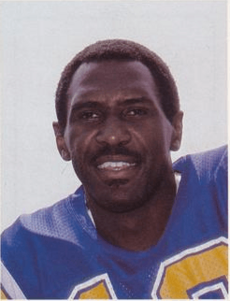
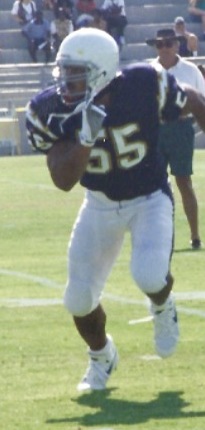
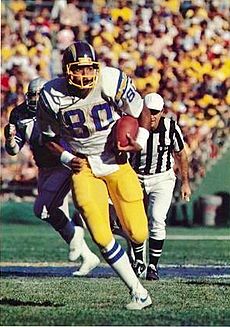
The Chargers have retired six jersey numbers. These are #14 for Dan Fouts, #18 for Charlie Joiner, #19 for Lance Alworth, #21 for LaDainian Tomlinson, #55 for Junior Seau, and #80 for Kellen Winslow. Usually, a player's number can be retired five years after they stop playing. Junior Seau was an exception to this rule. The Chargers have not retired many numbers.
| Los Angeles Chargers Retired Numbers | ||||
|---|---|---|---|---|
| No. | Player | Position | Years Played | Retired |
| 14 | Dan Fouts | QB | 1973–1987 | March 24, 1988 |
| 18 | Charlie Joiner | WR | 1976–1986 | September 10, 2023 |
| 19 | Lance Alworth | WR | 1962–1970 | November 20, 2005 |
| 21 | LaDainian Tomlinson | RB | 2001–2009 | November 21, 2015 |
| 55 | Junior Seau | LB | 1990–2002 | May 11, 2012 |
| 80 | Kellen Winslow | TE | 1979–1987 | September 10, 2023 |
Pro Football Hall of Famers
| * | Member of the Chargers Hall of Fame |
|---|---|
| † | Member of the Chargers Hall of Fame and number retired by Chargers |
| San Diego / Los Angeles Chargers Hall of Famers | ||||
|---|---|---|---|---|
| Players | ||||
| Name | No. | Position | Years Played | Inducted |
| Lance Alworth † | 19 | WR | 1962–1970 | 1978 |
| Ron Mix * | 74 | OT | 1960–1969 | 1979 |
| Johnny Unitas | 19 | QB | 1973 | 1979 |
| Deacon Jones | 75 | DE | 1972–1973 | 1980 |
| John Mackey | 89 | TE | 1972 | 1992 |
| Dan Fouts † | 14 | QB | 1973–1987 | 1993 |
| Larry Little | 72 | G | 1967–1968 | 1993 |
| Kellen Winslow † | 80 | TE | 1979–1987 | 1995 |
| Charlie Joiner † | 18 | WR | 1976–1986 | 1996 |
| Fred Dean * | 71 | DE | 1975–1981 | 2008 |
| Junior Seau † | 55 | LB | 1990–2002 | 2015 |
| LaDainian Tomlinson † | 21 | RB | 2001–2009 | 2017 |
| Antonio Gates* | 85 | TE | 2003–2018 | 2025 |
| Coaches & Front Office Staff | ||||
| Name | Position | Years with Team | Inducted | |
| Sid Gillman * | Head coach | 1960–1971 | 1983 | |
| Bobby Beathard * | General Manager | 1990–2000 | 2018 | |
| Don Coryell * | Head coach | 1978–1986 | 2023 | |
Chargers Hall of Fame
The Chargers started their own Hall of Fame in 1976. The players in this Hall of Fame are honored at the Chargers Ring of Honor. This was started in 2000. To be chosen, players must have been retired for at least four seasons. A special committee chooses the members.
50th Anniversary Team
The Chargers announced their 50th Anniversary Team in 2009. This team honored the best players and coaches in the team's history. The team was founded in 1959. The anniversary team included 53 players and coaches. Fans voted online, and their votes counted for half of the decision. Votes from Chargers Hall of Famers and local media made up the other half. Over 400,000 votes were cast online. Dan Fouts and LaDainian Tomlinson received the most votes. The team included 7 players who are in the Pro Football Hall of Fame. It also had 11 players who were still active on the 2009 Chargers team.
Team Staff
Head Coaches
Current Staff
|
→ Coaching staff |
|||||
Radio and Television Coverage
The Chargers' main radio station is KYSR-FM Alt 98.7 in Los Angeles. They have daily coverage and special shows on KLAC-AM 570 LA Sports. The play-by-play announcer is Matt "Money" Smith. NFL Network analyst Daniel Jeremiah also broadcasts games. KYSR-FM's sister station, KFI AM 640, was the main station from 2017 to 2019.
As of the 2020 season, Chargers preseason games are shown on KCBS-TV. In the former San Diego area, KFMB shows the games. Because of NFL TV deals, KCBS also shows most Chargers regular season games against AFC teams.
Dennis Packer is the public address announcer for Chargers home games at SoFi Stadium. He also announces USC football games.
The Chargers and Los Angeles Rams both play in Los Angeles. This means the Chargers cannot play home games or certain road games at the early 10:00 a.m. Pacific time slot. They also cannot play certain home games at the same time or on the same network as the Rams. Because of this, both teams often get more prime-time games than usual. If both teams play at the same time on Sunday afternoons, local TV stations can show both games on their secondary channels. In 2020, the Chargers signed a new TV deal with KCBS-TV and KCAL-TV for preseason games. They also have a weekly show with team news.
Radio Stations (English)
California
| City | Call Sign | Frequency |
|---|---|---|
| Los Angeles | KYSR/KSRY | 98.7/103.1 FM (Pre-Game [first two-hours], Full Game Coverage and 'Chargers Talk' Post-Game) |
| KYSR | 98.7 HD2 (HD radio simulcast of KLAC, will carry select games) | |
| KLAC | 570 AM (Secondary affiliate to KYSR, will carry select games) | |
| San Diego | KGB-FM | 101.5 FM |
| KGB | 760 AM | |
| Temecula/Inland Empire | KATY-FM | 101.3 FM |
| Yucca Valley | KNWH | 1250 AM/103.7 FM |
| Palm Springs | KNWQ | 1140 AM/94.3 FM |
| Coachella | KNWZ | 970 AM/104.7 FM |
| Palmdale/Lancaster | KAVL | 610 AM |
| Victorville/Hesperia | KMPS | 910 AM |
| Imperial Valley | KXO-FM | 107.5 FM |
Radio Stations (Spanish)
California
| City | Call Sign | Frequency |
|---|---|---|
| Los Angeles/Orange County | KBUE/KBUA | 105.5 FM/94.3 FM |
| San Diego/Tijuana, Mexico | XEMO-AM | 860 AM |
Mexico
| City | Call Sign | Frequency |
|---|---|---|
| Mexicali | XEHG | 1370 AM |
| Ensenada | XHEPF-FM | 89.1 FM |
Team Theme Song
The Chargers' team song is "San Diego Super Chargers". It was recorded in 1979. The song has a disco sound. The team used to play this song at home games after they scored or won.
See also
 In Spanish: Los Angeles Chargers para niños
In Spanish: Los Angeles Chargers para niños
 | Bayard Rustin |
 | Jeannette Carter |
 | Jeremiah A. Brown |


